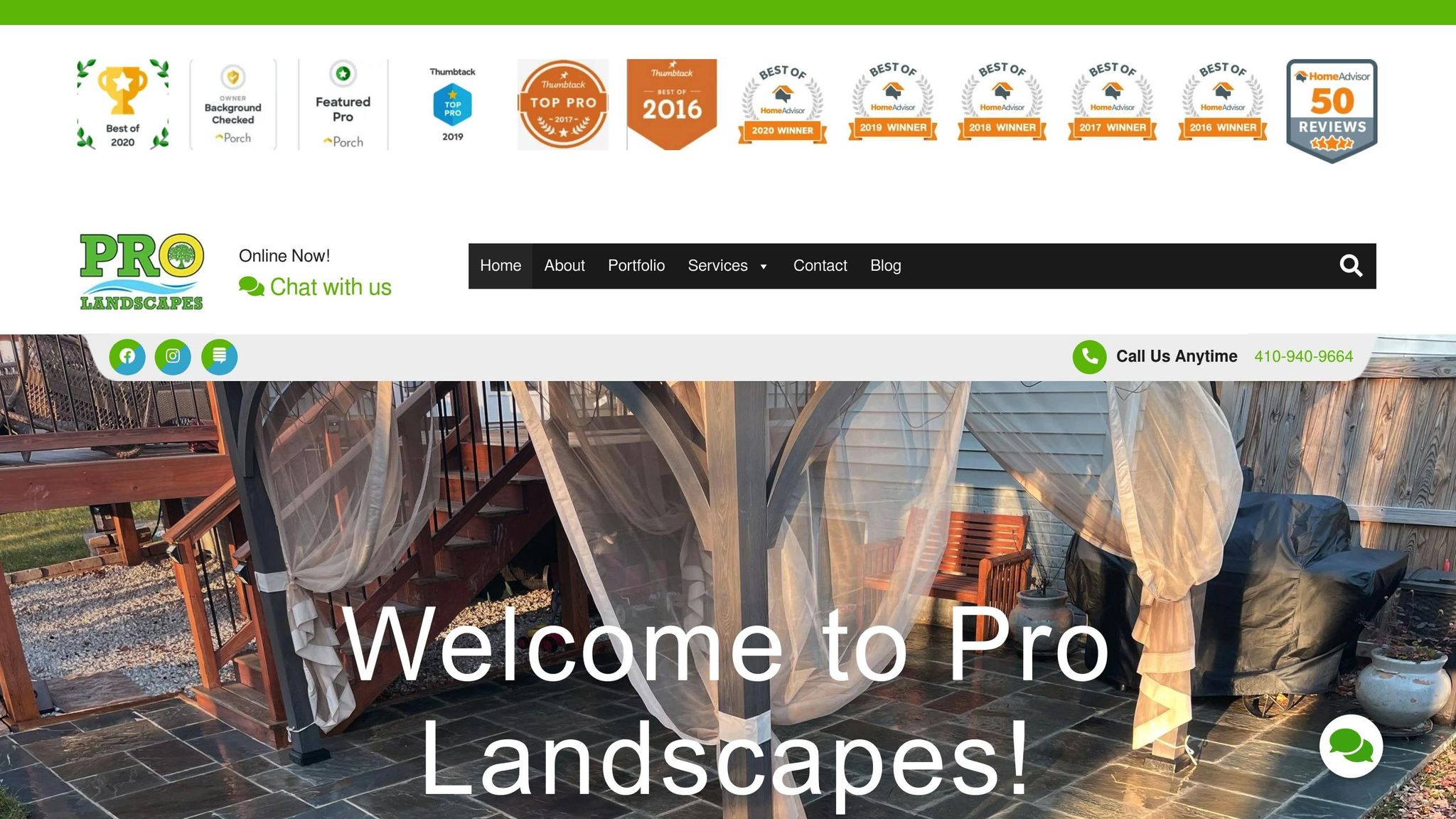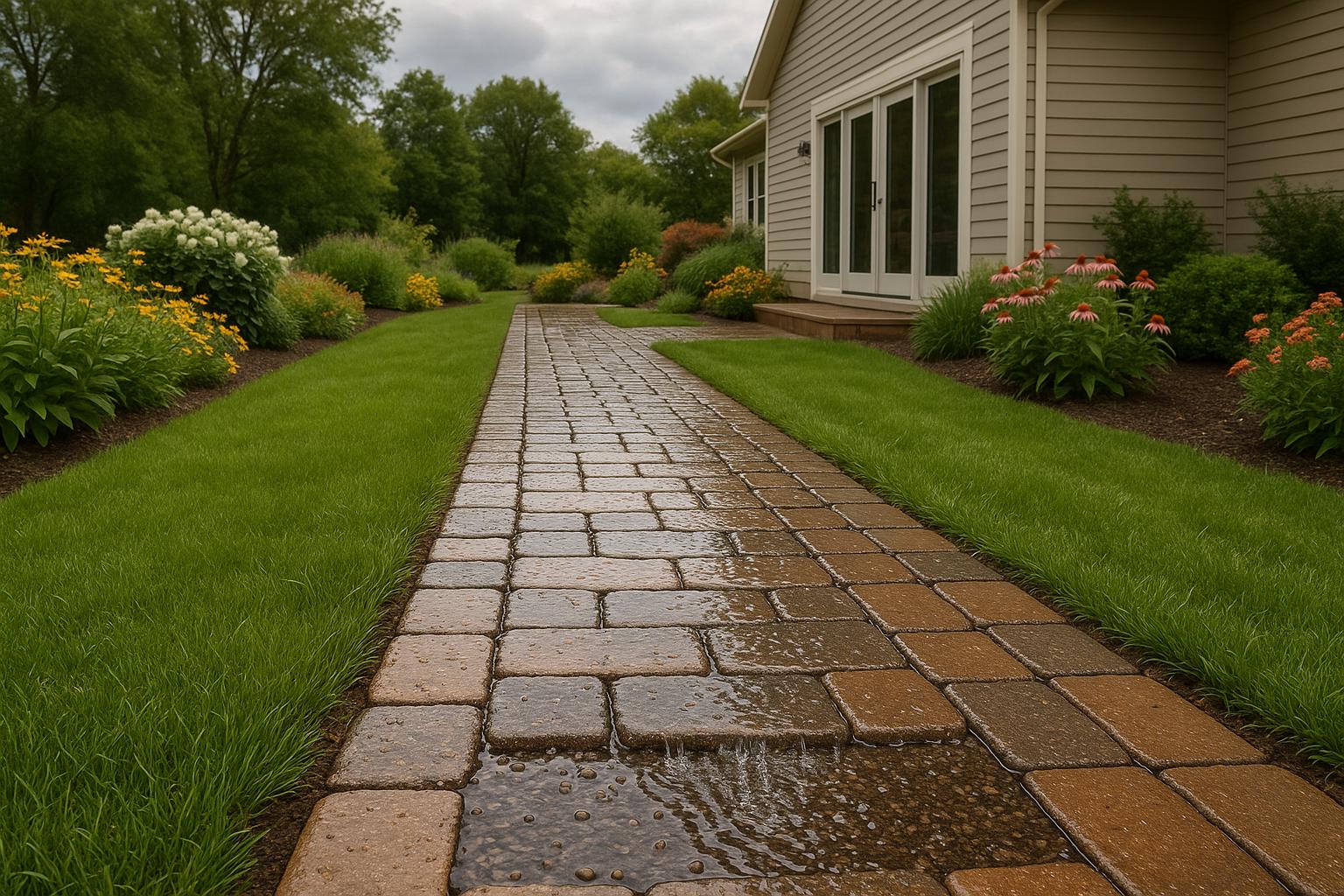- bhavya gada
- No Comments
Stormwater runoff is a growing issue for Maryland homeowners, causing property damage, flooding, and pollution in local waterways. Permeable pavers offer a practical solution by allowing water to seep into the ground instead of rushing off impervious surfaces like concrete or asphalt. These systems reduce runoff, filter pollutants, and protect foundations, all while adding style to outdoor spaces.
Key Takeaways:
- Stormwater Challenges: Flooding, erosion, and water pollution are common problems due to impervious surfaces.
- Permeable Paver Benefits:
- Reduces runoff and prevents flooding.
- Filters pollutants, improving water quality.
- Protects landscaping and property foundations.
- Design Options: Suitable for driveways, patios, and walkways with various styles, colors, and materials.
- Long-Term Savings: Lower maintenance costs and fewer repairs offset the higher upfront investment.
Pro Landscapes MD specializes in installing these systems, blending effective water management with attractive designs tailored to Maryland’s climate. For homeowners, permeable pavers are a smart way to address stormwater issues while improving outdoor spaces.
ECO Permeable Pavers: Installation Essentials
How Permeable Pavers Work: Basic Principles
Permeable pavers are a smart solution for managing stormwater, especially for Maryland homeowners dealing with drainage issues. These systems are designed to replicate nature’s way of filtering and absorbing water, offering practical and environmental benefits.
Structure and Function of Permeable Pavers
At their core, permeable pavers rely on a layered system that encourages water infiltration. The top layer consists of the pavers themselves, which are typically made from materials like concrete, clay, or natural stone. These pavers are engineered with small gaps or porous surfaces that allow water to pass through.
Below the surface, a sub-base made up of larger aggregates – such as crushed stone or gravel – plays a critical role. This layer includes void spaces to temporarily hold water while filtering out debris and pollutants. Often, a geotextile fabric is added to prevent fine sediments from clogging the system.
This setup allows permeable pavers to manage impressive amounts of water. For instance, their infiltration rates range from 5.6 to 18.5 gallons per minute per square foot [3]. To put that into perspective, a 200-square-foot permeable paver patio could handle over 1,000 gallons of water per minute during a typical Maryland thunderstorm. Beyond just managing water, this layered design also supports natural pollutant filtration.
Water Quality Benefits of Permeable Paver Systems
Permeable paver systems don’t just move water – they clean it too. The U.S. EPA highlights that “Permeable pavements can help filter out pollutants that contribute to water pollution” [1]. As water flows through the sub-base, larger particles are physically trapped, while chemical and biological processes break down harmful pollutants [4].
Studies back up these claims. In Madison, Wisconsin, researchers monitored three types of permeable pavements over 22 months. Their findings showed that these systems significantly reduced sediment and sediment-bound pollutants in runoff [2].
Additionally, filtered water gradually seeps into the ground, helping replenish local groundwater supplies and supporting the natural water cycle. For Maryland homeowners, permeable pavers offer a twofold benefit: they solve immediate stormwater issues while promoting long-term environmental health.
Solving Stormwater Problems with Permeable Pavers
In Maryland, heavy rains often lead to flooded yards and damaged foundations, especially when traditional pavements prevent water from soaking into the ground. Permeable pavers offer a smart solution by allowing rainwater to seep into the soil, reducing runoff and protecting properties from water-related damage.
Common Stormwater Problems: Flooding, Runoff, and Erosion
Flooding is one of the most noticeable issues during storms. When rainwater can’t penetrate the ground, it pools around home foundations, leaks into basements, and leaves behind standing water that’s slow to drain.
Runoff becomes a problem when water rushes across properties, carrying debris and pollutants into storm drains. This not only overwhelms local drainage systems but can also lead to street flooding.
Soil erosion occurs when fast-moving water strips away the topsoil, damaging landscaping and carving channels through lawns and garden beds. This not only reduces curb appeal but also creates ongoing maintenance headaches and can lower property values.
An example of the effectiveness of permeable pavers comes from a North Carolina medical building project, where minimal runoff was reported, along with cost savings of over $200,000 on stormwater management systems [7].
By enabling water to soak into the ground, permeable pavers help recharge groundwater and significantly reduce runoff [5][6][7]. These benefits make it worth comparing their performance to that of standard pavement systems.
Permeable Pavers vs. Standard Pavement
| Feature | Permeable Pavers | Standard Pavement |
|---|---|---|
| Stormwater Impact | Allows water to infiltrate the ground, reducing runoff and preventing flooding and erosion [5][6] | Impervious surface increases runoff, leading to flooding and erosion [6] |
| Water Quality | Filters pollutants naturally, reducing nitrates by over 70% and nitrogen by 40% [7] | Does not filter pollutants, allowing them to flow into waterways [6] |
| Maintenance | Requires occasional cleaning to prevent clogging [5] | Needs regular repairs, such as sealing, resurfacing, and fixing cracks [6] |
| Long-term Costs | Saves money by reducing the need for stormwater infrastructure [7] | Higher costs for drainage systems and repairs related to flooding [7] |
Research shows that permeable, interlocking concrete pavement can reduce nitrates by over 70% and nitrogen by 40% in stormwater, offering substantial environmental benefits [7]. As water flows through the gaps between pavers and the layers of aggregate below, pollutants are filtered and broken down naturally by the soil.
For Maryland homeowners, permeable pavers go beyond technical advantages – they also provide long-term savings on maintenance and stormwater management. By reducing the risk of flooding and erosion, they can lead to lower insurance premiums and fewer repair costs. Hiring skilled contractors ensures proper installation, maximizing the performance and lifespan of these systems.
sbb-itb-843f8be
Improving Outdoor Appearance with Permeable Pavers
Permeable pavers do more than just tackle stormwater issues – they also bring a polished, stylish look to outdoor spaces. These eco-friendly options combine effective drainage with eye-catching designs, making them an ideal choice for homeowners looking to enhance their property’s curb appeal. Unlike traditional concrete or asphalt, which can create impermeable surfaces, permeable pavers open up a world of design possibilities. As Belgard puts it:
"Outdoor landscaping and design is no longer just about creating a beautiful and functional zone. Our experts explain how to make sound environmental decisions without sacrificing style" [8].
By blending practical stormwater management with modern aesthetics, these pavers offer a unique way to elevate outdoor spaces. With a variety of materials, shapes, colors, textures, and patterns available, they can complement a wide range of architectural styles, from sleek and modern to timeless and classic.
Design Options: Patios, Driveways, and Walkways
Permeable pavers are versatile enough to work in various outdoor applications, offering flexibility and style that traditional pavements can’t match. Manufacturers provide options designed to balance durability with design, featuring square and rectangular shapes in a range of colors and textures [8] [11].
For driveways, these pavers are built to handle heavy traffic while maintaining their permeability and resisting stains. Patios, on the other hand, benefit from modular designs and natural finishes that seamlessly blend hardscaping with surrounding greenery. Some grid-style pavers even allow grass or gravel to grow between them, creating a natural and integrated look.
When it comes to walkways and pathways, the design possibilities are endless. Creative patterns like circular motifs, geometric layouts, or custom borders can help define different areas of your outdoor space. For an added touch, you can incorporate contrasting pebbles or plant ground covers like Woolly Thyme between flagstones [13].
Permeable pavers also support urban landscaping by accommodating tree roots, allowing mature trees to coexist with hardscaped areas. This creates a harmonious blend of greenery and structure, giving outdoor spaces a natural, park-like feel [10].
Increasing Property Value with Eco-Friendly Landscaping
The benefits of permeable pavers go beyond aesthetics and environmental advantages – they can also boost your property’s value. Many eco-conscious buyers are drawn to homes with sustainable features like these pavers [9]. By reducing the urban heat island effect, they make outdoor spaces more comfortable during Maryland’s hot summers [10], and their design helps minimize ice buildup in the winter months [9].
While the initial cost of permeable pavers may be higher due to specialized materials and installation [12], they offer long-term savings and enhance property value. Maryland homeowners can even pair these pavers with rainwater harvesting systems, making them a smart choice for sustainable living [9].
Proper installation is key to ensuring the durability, functionality, and appearance of permeable pavers [13]. For driveways, choosing high-durability pavers that can handle Maryland’s freeze-thaw cycles and heavy traffic is essential [11]. For patios and walkways, selecting pavers that balance modern aesthetics with effective drainage ensures a space that’s both attractive and practical [11].
As more homeowners embrace sustainable landscaping, properties with permeable pavers are becoming increasingly desirable. These features not only solve practical issues but also enhance outdoor living spaces, making them a standout choice in today’s real estate market [11].
Pro Landscapes MD: Your Permeable Paver Specialists

When it comes to tackling stormwater challenges in central Maryland, Pro Landscapes MD stands out as a trusted expert in permeable paver installations. Covering areas like Howard County, Montgomery County, Carroll County, Frederick County, Prince George’s County, Baltimore County, and even Washington, DC, the company has earned a reputation for blending effective water management with stunning outdoor designs.
Their process goes beyond just laying pavers. They integrate advanced stormwater management techniques with thoughtful landscaping to create solutions that work harmoniously with Maryland’s unique climate and soil. With a team of skilled horticulturists, they combine technical expertise with an eye for design, ensuring that each project is both functional and visually appealing.
Stormwater Management and Landscaping Expertise
Pro Landscapes MD takes a comprehensive approach to outdoor solutions, seamlessly merging stormwater management with aesthetic landscaping. Their services include drainage solutions like French drains, dry riverbeds, integrated stormwater systems, grading, and land leveling – all designed for durability and efficiency.
But they don’t stop at drainage. They transform entire outdoor spaces by incorporating features like landscape design, planting, retaining walls, garden walls, fire pits, and outdoor kitchens. These elements are carefully coordinated with permeable paver systems to allow water to flow naturally through the landscape, reducing runoff while enhancing the overall look and usability of the space.
Their expertise shines in the details. From precise grading to selecting the right base materials, Pro Landscapes MD ensures that every installation is built on a solid foundation. Proper attention to slope and drainage patterns means their projects not only look good but also handle water effectively, even in Maryland’s challenging weather conditions.
Results That Speak for Themselves
The results of Pro Landscapes MD’s work are evident in the experiences of their clients. Homeowners report dramatic improvements in drainage and a noticeable reduction in flooding issues. At the same time, their properties gain curb appeal and even increase in value. Spaces once plagued by pooling water or erosion are transformed into functional and beautiful outdoor areas.
Clients often highlight the company’s attention to detail, such as the creative use of stacked stones around trees and flowerbeds, which adds both functionality and charm. Whether it’s an urban property in Baltimore or a suburban home in Columbia, each project is tailored to address specific water management needs while reflecting the homeowner’s design preferences.
Beyond aesthetics, Pro Landscapes MD’s use of environmentally friendly pavers plays a key role in sustainability. These systems allow water to seep into the ground, filter out pollutants, and recharge groundwater, contributing to healthier ecosystems while solving practical problems.
Their commitment to quality doesn’t end with installation. With a deep understanding of Maryland’s freeze-thaw cycles, heavy rains, and soil conditions, Pro Landscapes MD ensures that their systems perform reliably year-round. This combination of technical knowledge and a wide range of services makes them a top choice for homeowners looking to solve stormwater issues without sacrificing style.
Conclusion: The Double Benefits of Permeable Pavers
Permeable pavers offer a winning combination for homeowners – managing stormwater effectively while elevating the look of outdoor spaces. For Maryland residents dealing with flooding, runoff, and erosion, these systems provide a practical and visually appealing solution.
When it comes to water management, the advantages are undeniable. Unlike traditional concrete or asphalt, permeable pavers absorb water efficiently, helping to prevent pooling and flooding during heavy rains. They also filter out pollutants, protect groundwater quality, and reduce erosion, which can damage driveways, patios, and walkways over time.
On top of their functionality, permeable pavers enhance property aesthetics. With a variety of design options available, they allow homeowners to create beautiful patios, walkways, and driveways that combine timeless charm with effective water management.
While the initial cost may be higher, the long-term savings are notable. Reduced expenses for drainage repairs and erosion control, coupled with an increase in property value, make permeable pavers a smart investment.
Key Points
Here’s a quick recap of the main benefits:
- Effective Water Management: Superior absorption reduces flooding, filters pollutants, and prevents erosion.
- Enhanced Aesthetics: Versatile designs improve the look of outdoor spaces.
- Long-Term Savings: Lower maintenance costs and increased property value offset higher upfront expenses.
Maryland’s challenging climate – with heavy summer rains and freeze-thaw cycles – requires durable solutions that perform year-round. Permeable pavers are up to the task, maintaining their strength and functionality in all seasons.
Proper installation is key to maximizing these benefits. Factors like base preparation, slope adjustment, and material selection are critical for long-term performance. Working with skilled professionals who understand local conditions ensures your system is built to last.
For homeowners across central Maryland – from Columbia to Bethesda, and Ellicott City to Silver Spring – permeable pavers offer an effective way to tackle stormwater issues while creating inviting outdoor spaces. Their unique ability to combine environmental responsibility, visual appeal, and practical performance makes them a standout choice.
Pro Landscapes MD specializes in bringing this dual advantage to life, blending expert stormwater management with creative design. The result? Maryland properties that are not only functional but also beautifully in sync with nature.
FAQs
How do permeable pavers help protect water quality in nearby streams and rivers?
Permeable pavers play a crucial role in safeguarding water quality by allowing stormwater to filter through their surface naturally. As the water passes through, these pavers capture pollutants such as oils, heavy metals, and sediments, stopping these contaminants from entering nearby waterways.
This natural filtration process helps reduce pollution and lessens the impact of urban runoff on aquatic ecosystems. By managing stormwater more efficiently, permeable pavers help maintain cleaner and safer water sources, promoting healthier environments for both communities and local wildlife.
What are the financial advantages of choosing permeable pavers over traditional pavement in the long run?
Permeable pavers come with several financial advantages over traditional pavement, especially in the long run. One standout benefit is their durability – when properly maintained, they can last more than 25 years. This extended lifespan means fewer repairs and replacements, which translates to noticeable savings over time.
Another key advantage is their ability to manage stormwater effectively. By reducing runoff and helping prevent flooding, permeable pavers can cut down on the need for expensive drainage systems. They also help protect surrounding areas from potential water damage, further reducing costs. Choosing permeable pavers not only upgrades your outdoor space but also offers a smart way to save money over the years.
Are permeable pavers suitable for areas with heavy rain or freezing temperatures?
Permeable pavers are a smart option for regions that experience heavy rainfall or freeze-thaw cycles. Their structure lets water filter through the surface, which helps prevent pooling and reduces the risk of icy patches during colder months. When installed and maintained correctly, they’re also less likely to crack due to the stress of freeze-thaw cycles.
To ensure they hold up over time, it’s crucial to use top-notch materials and have them professionally installed. With proper upkeep, permeable pavers can last 20–30 years, offering a durable and environmentally friendly way to manage stormwater effectively.


















Chat with Us